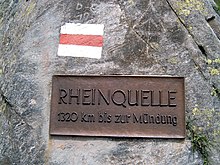Wikipedia:Wikipedia Signpost/2010-03-29/In the news
Overdue correction, Critical Point of View conference, brief headlines
Wikipedia is first reference work to correct long-standing error about the Rhine river


Wikipedia's ability to correct errors quickly was mentioned in recent German media coverage of a surprising blunder that has permeated most reference works, school books and even government publications for decades. A basic fact about one of Europe's most important rivers was discovered to have been incorrectly reported: Generations of school children in Germany and the whole world have learned that the Rhine is about 1320 km long. However Bruno Kremer, a biologist at the University of Cologne, found this number to be inconsistent during his research for an upcoming book (ISBN 978-3874634564). According to Süddeutsche Zeitung, at the beginning of the last century the length was still stated correctly to be around 1230 km by the major encyclopedias (the Brockhaus encyclopedia of 1903, the Herder lexicon of 1907 and Meyers Konversations-Lexikon of 1909). Later editions such as the Brockhaus editions of 1933 and today give numbers around 1320 km, an error that Kremer conjectures to have been caused by simple transposition of digits. Encyclopædia Britannica's Rhine River article is even further off, giving a value of 1390 km.
Süddeutsche Zeitung devoted a whole page of its 27/28 March print edition to the topic, concluding:
- "Cleaning up will take a while ... while atlases, school books, web pages and brass plates have to be changed. At the moment, the online lexicon Wikipedia is ahead of everybody: In January, a pensioner from Leutesdorf near Koblenz [de:Benutzer:Frila, a former inland navigator] has inserted Bruno Kremer's length information into the "Rhein" entry."
That correction on the German Wikipedia was made after a local newspaper had mentioned Kremer's research, and German Wikipedians had reviewed many other sources. On the English Wikipedia, the correction was made on 27 March.
The corrections were noted in a number of follow-up articles published later that week. The Dutch newspaper NRC Handelsblad ran a brief article on page 4 which mentioned the changes,[1] there was a full-page article in the world news section of the Norwegian paper Aftenposten which went into more detail,[2] and there was a brief mention in the German newsmagazine Der Spiegel.[3]
Conference examines Wikipedia from a "Critical Point of View"
The second part of the "CPOV" conference about Wikipedia took place in Amsterdam, Netherlands on 26/27 March, organized by Geert Lovink's Institute of Network Cultures. (The first part, entitled "WikiWars", had been held in January at the Centre for Internet and Society in Bangalore, India.)
Talk summaries have been posted to the institute's blog. This animation gives an impression of the coverage on Twitter.
Talks included:
- Mayo Fuster Morell: Wikimedia Governance: The Role of the Wikimedia Foundation and the Form and Geopolitics of its Internationalization. Summary, presentation notes, see also her text Wikimedia evolution in terms of governance and the creation of a Foundation published in the run-up to the conference and her talk at Wikimania 2009 about a similar topic.
- Felipe Ortega: New trends in the evolution of Wikipedia. Summary, Slides - Ortega presented his quantitative research about participation on the ten largest Wikipedias, some interpretations of which had been controversial last fall (see earlier Signpost coverage).
- Joseph Reagle: Wikipedia and Encyclopedic Anxiety. Summary, slides - Reagle aimed to "make sense some of the criticism Wikipedia receives in a historical frame", arguing "that reference works can serve as a flashpoint for larger social anxieties about technological and social change", giving historical examples for criticism of reference works such as Encyclopedia Britannica and Webster's Dictionary.
The CPOV conference was preceded by a small Wiki Analytics Workshop held by the Digital Methods Initiative at the University of Amsterdam.
Briefly
- A number of media outlets covered the 24 March Wikipedia downtime; see this week's "News and notes".
- The usability initiative's announcement of the impending deployment of the new user interface generated some media coverage; see this week's "News and notes".
- The Jakarta Post reported on an upcoming writing contest for university students to improve the Indonesian Wikipedia. The winner "will represent Indonesia at the Wikimania 2010 International Conference in Gdansk, Poland". On his blog, GerardM has provided more information.



Discuss this story
So if we're so inaccurate and unreliable, how can someone explain that we are now the ONLY modern reference work that has an accurate article on the Rhine River? かんぱい! Scapler (talk) 23:44, 31 March 2010 (UTC)[reply]
Maybe at a close enough granularity, the longer value is also correct. Shoreline length versus navigation transit distance? 99.27.201.226 (talk) 03:46, 1 April 2010 (UTC)[reply]